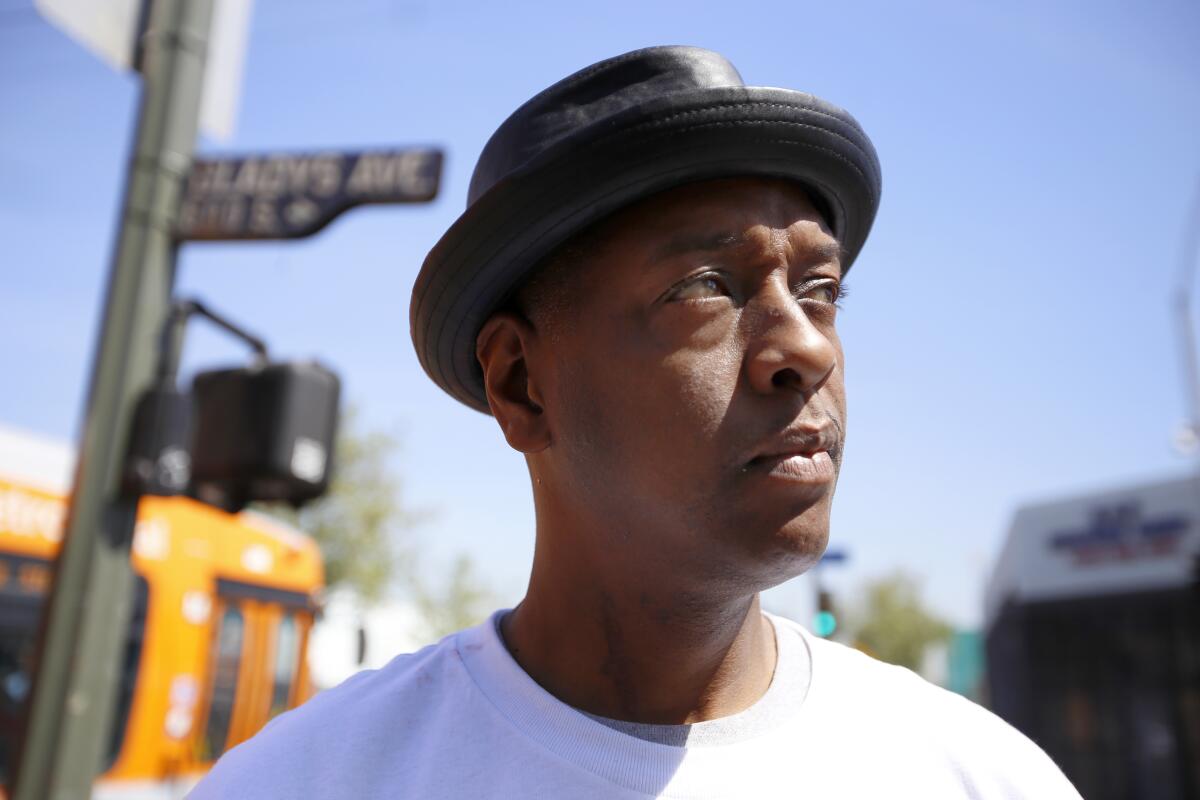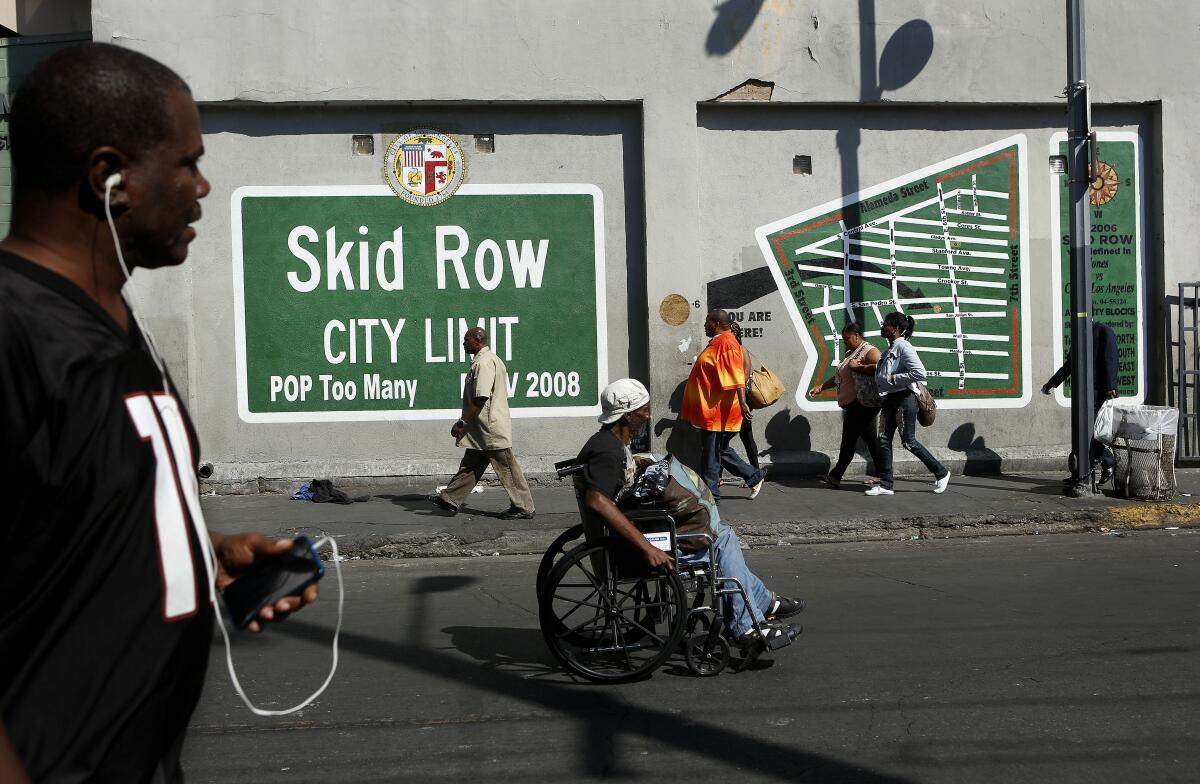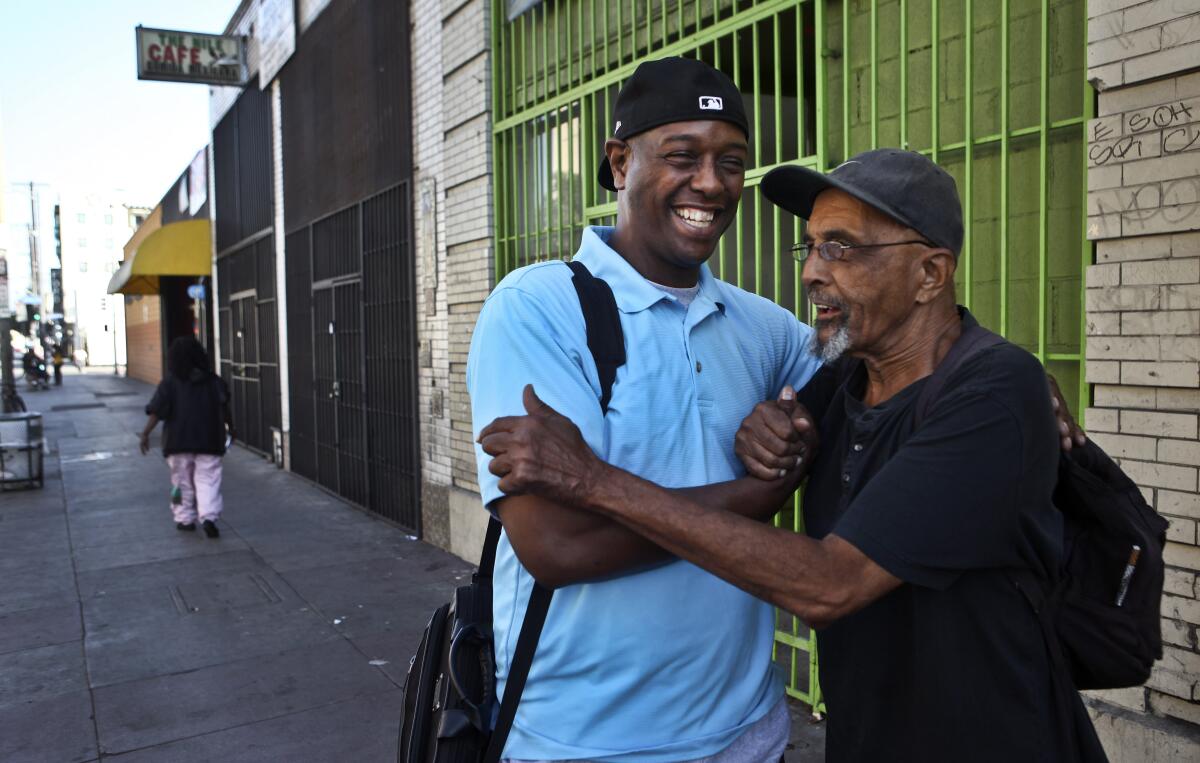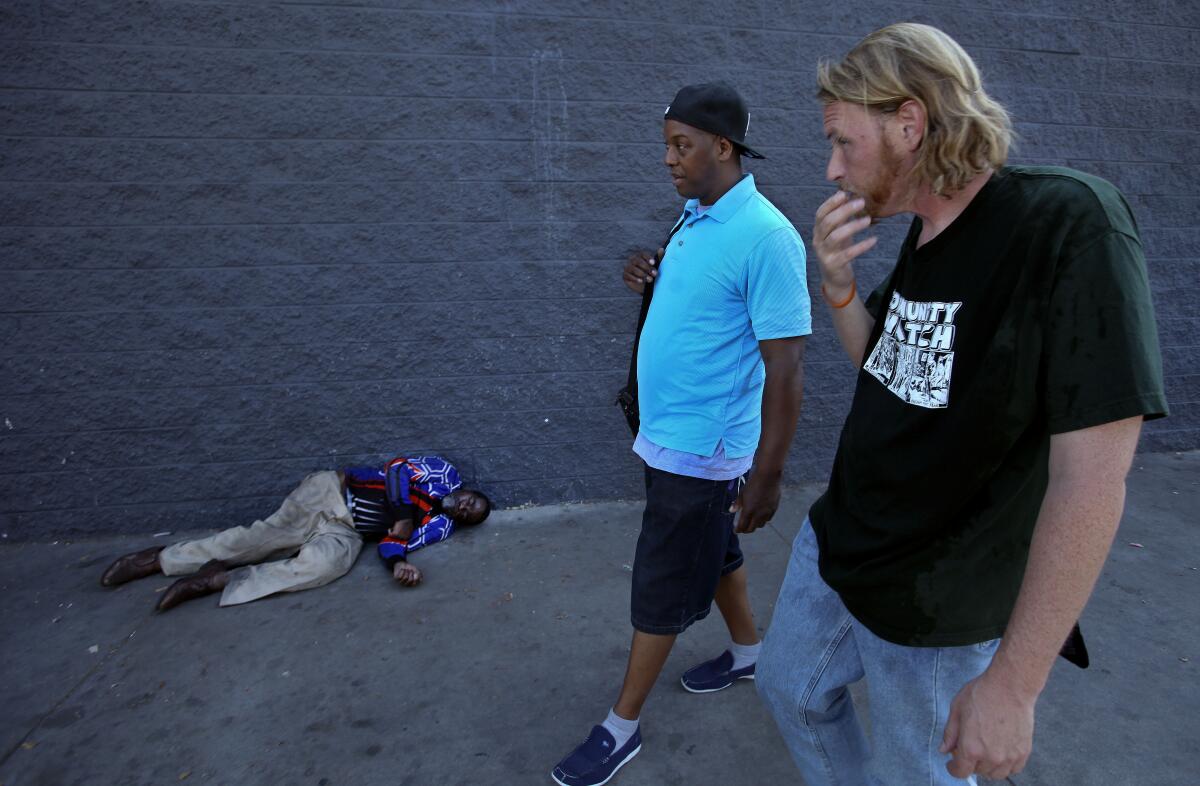The powerful legacy of General Jeff Page, West Coast hip-hop pioneer and ‘mayor of skid row’

- Share via
A conference in a lawsuit accusing local government of bungling its homelessness response was winding down with the usual federal courthouse pomp when a booming voice broke in from the back.
“I don’t believe the voices of skid row have been heard,” bellowed General Jeff Page, skid row community leader Pete White recalled Page telling U.S. District Judge David O. Carter. Soon the judge and Page were “thick as thieves,” White said, traipsing around skid row homeless tents at all hours, in a relationship that by some accounts influenced the judge’s orders.
“After a year, the judge sounded more like General Jeff than General Jeff,” said White, a member of the Los Angeles Community Action Network.
Page, a West Coast hip-hop pioneer who earned the name “mayor of skid row” while fighting to reclaim skid row from its city designation as a homelessness “containment zone,” died Oct. 13 at 56 after suffering a stroke and heart problems.
His “positivity” movement left an indelible mark on the skid row landscape. A mural map of the area’s city limit is marked “Pop: Too Many.” A world-class basketball court that Page brought Nike in to build for the 3-on-3 basketball league he founded. Christmas lights at Gladys Park and outdoor movies on hot summer nights.

Even as upscale development closed in from all sides, Page helped change the narrative on skid row, which he championed as one of the city’s last majority-Black neighborhoods, made up of renters, recovery workers and homeless people who deserved their own political voice. He was continuing to fight for a separate neighborhood council for the 50-block downtown district when he fell ill.
“We’ve lost a titan in skid row,” said White, “one of the greatest activists, and one of the community’s loudest megaphones.”
Page was a proud native of South Los Angeles and played basketball at Crenshaw High School, a court leader, which earned him the nickname “General,” said his niece Tanesha Johnson.
The name stuck as he became an integral member of the emerging West Coast hip-hop scene. While in high school he joined a street crew that posted telephone pole fliers for dances featuring often-overlooked pioneers such as Uncle Jamm’s Army, Johnson said.
His affiliations also included the L.A. Dream Team and the hip-hop group Bobby Jimmy and the Critters, Johnson said. General Jeff, who as a child had roles in a horror film and commercials, wrote lyrics for the group and played a falsetto-rapping insect with bobbing antennae in the Critters’ video parody “Roaches,” a takeoff on the hit song “Rumors.”
Pastor J’n Marie Cue of skid row’s Church Without Walls first met Page in 1988 in Texas. Page was touring as a hype man for Rodney O and Joe Cooley. Their classic 1987 anthem “Everlasting Bass” is considered the origin of the Florida hip-hop subgenre Miami Bass, sampled by artists such as Lil Wayne. Cue’s group, the College Boys, opened for the group.
“He was a very charming individual, someone people gravitated toward,” Cue said.
Page produced and mixed music for other performers and kept his hand in hip-hop as an assistant to MC Eiht and DJ Quik, who worked with the biggest names in L.A. gangsta rap, including Dr. Dre, the late Eazy-E and Ice Cube, Johnson said.
Page was the fun uncle, cracking jokes and playing with the kids, said Johnson, who survives him, along with his sister Jacqueline Anderson, brothers Jerome Anderson, Johnnie C. Page, Johnathan Page and Deacon Ronnie Page, and nephew Terraine Williams.

Page said he arrived on skid row in August 2006 with a store of cash and a drum set determined to bring positivity to a neighborhood mired in misery. He slept in the streets, at a shelter and finally in a single-occupancy room, growing deeply disillusioned with what he saw as the failure of the homeless services groups — which he called “poverty pimps” and “the homeless industrial complex.” His advocacy helped win permission for residents of skid row hotels, an important source of very low-income housing, to have guests in their rooms.
He launched chess and photography clubs and a trash patrol led by residents. He advocated to bring families back to skid row and fought to keep out alcohol-serving outlets to preserve an area that he and other activists described as the largest recovery community in the country.
At first, Page worked within the system, serving several terms as the skid row representative on the Downtown Los Angeles Neighborhood Council, on the city’s park board and on a mental health advisory board. Being outvoted on the downtown board convinced him the area needed its own voice, and he launched an effort to carve a skid row neighborhood council out of two downtown jurisdictions.
He brought in video testimonials from hip-hop luminaries and sparked a burst of enthusiasm from skid row residents, who lined up to cast ballots. The city, at the eleventh hour, authorized online voting, which favored opponents with internet access and the effort died. An oversight panel upheld Page’s complaints of illegal electioneering, but the city overturned the decision. Page filed a lawsuit that is on appeal, White said.
City Councilman Kevin de León saw Page as “a gentle giant” but who could turn fierce at any sign of bullying or disrespect to Black people. When one of the City Council’s gadflies showed up at a meeting in a Ku Klux Klan hood and robe, Page ran him off in minutes.
“He was very intense and he didn’t take any mess,” Cue said.

Page was long a thorn in the side of the Los Angeles Police Department, which he felt criminalized homelessness and cycled people in and out of jail and skid row, leaving them in worse shape than before their arrests. In 2014, he was tried in an LAPD sting case that he believed was trumped up because of his activism. He beat the main charge of loitering for drug activities and walked away from a secondary count of resisting arrest with a sentence of 20 days of community service — working for his own skid row grass-roots community group, Issues and Solutions.
The following year, he took a leadership role in protests after the fatal LAPD shooting of Charly “Africa” Keunang, an unarmed mentally ill homeless man. A bystander’s video of Keunang’s shooting in broad daylight outside his skid row tent was viewed millions of times on Facebook.
Page broke with some of his usual allies in opposing Proposition HHH, the $1.2-billion L.A. city housing bond initiative passed in 2016, which he felt had been overbilled as a solution to homelessness. As homelessness exploded, Page spoke to students at USC, urban theorists in Berlin and podcasters. When asked for a single strategy to fix homelessness, he turned the question back on itself.
“There is a whole alphabet of issues, pick one.... The military has billions, what about your guys? Women’s rights organizations, come help your ladies,” Page said. “We are building our own community.”
More to Read
Sign up for Essential California
The most important California stories and recommendations in your inbox every morning.
You may occasionally receive promotional content from the Los Angeles Times.














